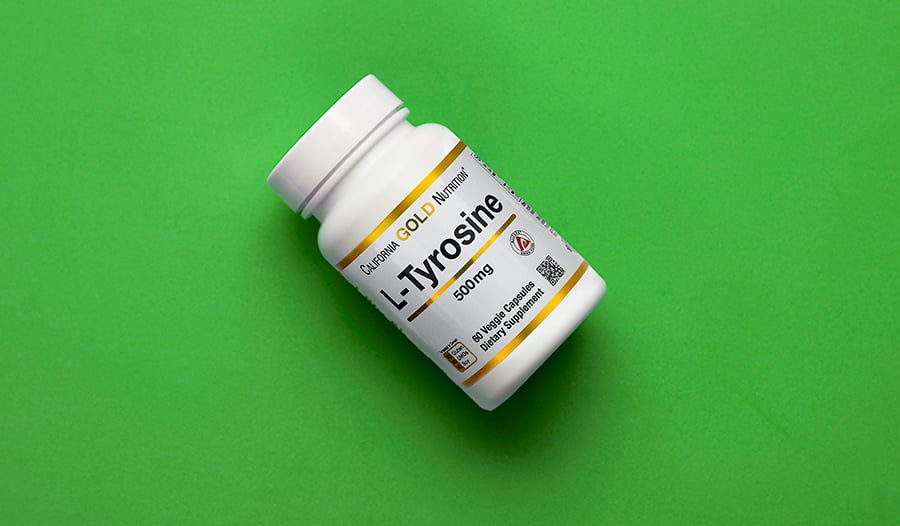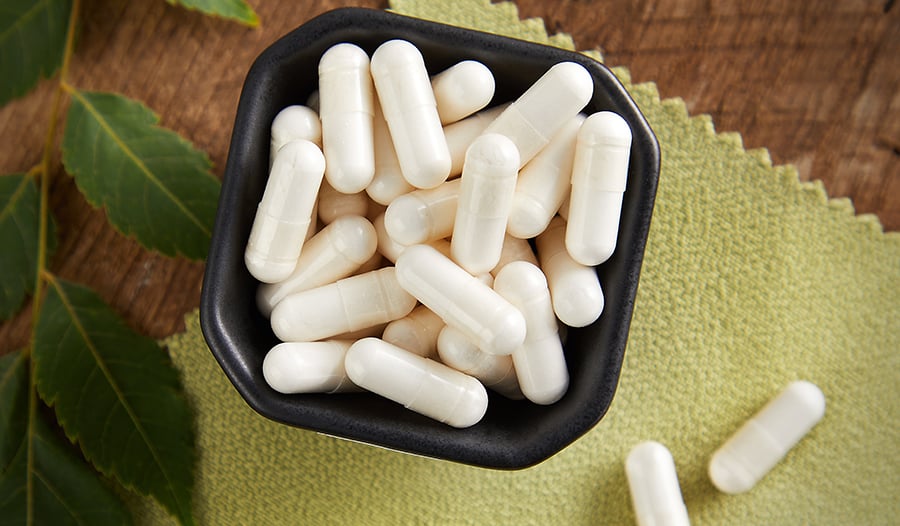7 Health Benefits of Tyrosine

What is Tyrosine?
Tyrosine, also known as L-Tyrosine, is a non-essential amino acid. Although very important, it is considered “non-essential” because the body can produce the amino acid by converting phenylalanine into tyrosine. However, there is a rare medical condition called PKU (phenylketonuria) in which some lack the enzyme required for this conversion.
A healthy, well-rounded diet plays an important role in ensuring adequate vitamins, minerals, and amino acids, including tyrosine. The Federal Drug Administration (FDA), the agency that oversees supplement safety, considers tyrosine “Generally Regarded As Safe” when taken as a supplement.
The Importance of Tyrosine
Tyrosine is necessary to make hormones such as adrenaline, thyroid hormones, and others listed below.
During times of emotional and physical stress, the body will require more tyrosine than in less stressful times. As a result, tyrosine is commonly found in pre-workout supplements and workout formulas.
Tyrosine > Dopamine > Noradrenaline (Norepinephrine) > Adrenaline (Epinephrine) |
- Adrenalin – helps during times of stress and danger. It causes the heart to beat faster, increases blood pressure, and aids in the delivery of blood to the brain and muscles. It also helps create mental focus.
- Dopamine – helps with mood, motivation, bodily function, and reward. It is considered a chemical messenger and the “feel-good chemical” by many. When you are achieving goals and having fun, the brain is flooded with dopamine.
- Norepinephrine – helps with muscle recovery and circulation while also helping during times of stress. Works together with adrenaline to increase blood flow to the brain and muscles.
- Thyroid Hormones – an important hormone that helps control metabolism among many other functions. When underactive, it can cause dry skin, weight gain, memory issues, constipation, depression, fatigue, and much more.
- Melanin – the substance in hair, eyes, and skin that provides pigmentation.
- Melatonin – a hormone manufactured by the brain that plays an important role in ensuring a good night’s sleep. It is also a potent antioxidant and has anti-tumor properties.
Food Sources of Tyrosine
- Soy products
- Chicken
- Turkey
- Fish
- Peanuts
- Almonds
- Avocados
- Bananas
- Milk
- Cheese
- Yogurt
- Cottage cheese
- Lima beans
- Pumpkin seeds
- Sesame seeds
Health Benefits of Tyrosine
Memory and Cognitive Function
Optimizing brain function is important at every age. However, as we get older, cognitive decline is inevitable. Fortunately, there are things you can do to help keep brainpower at its best—eating a healthy, balanced diet, partaking in regular physical activity, and getting good sleep are all important. According to studies, supplements such as tyrosine may also be beneficial.
For example, a small 1994 study tested 16 healthy subjects. Half were given tyrosine, and the other half were given a placebo pill. Test subjects were then asked to perform stress-sensitive tasks. Researchers found that tyrosine supplementation improved performance one hour after administration when compared to the placebo.
A 1995 study evaluated the effects of tyrosine on brain function during times of sleep deprivation. In the study, test subjects who work at night were given a series of tests. In total, they were awake for more than 24 hours. Half the subjects were given tyrosine while the other half took a placebo. Those given tyrosine saw less of a decline in their performance compared to those given a placebo. The researchers concluded that tyrosine could be useful in helping to prevent performance decline in those who are sleep deprived.
Further, a 2015 study showed that tyrosine enhances cognitive performance, especially during times of stress. The researchers went on to conclude that tyrosine “is an effective enhancer of cognition, but only when neurotransmitter function is intact” and when dopamine and/or norepinephrine were temporarily depleted.
Lastly, a 2015 double-blind, randomized controlled study evaluated 22 healthy adults. Half were given tyrosine while the other half were given a placebo. The researchers concluded that tyrosine promoted cognitive flexibility by maintaining optimal brain function.
Multitasking
In today’s age where many of us are being pulled in various directions, the ability to multitask is an essential skill. However, this may be easier for some than for others.
A 1999 study found that tyrosine may help with multitasking. This study concluded that “…tyrosine may sustain working memory when competing requirements to perform other tasks simultaneously degrade performance, and that supplemental tyrosine may be appropriate for maintaining performance….”
Depression
Depression is a common condition that affects hundreds of millions of people worldwide. There are many causes, and they can be complex. Many seek healthcare assistance or take pharmaceuticals to help eliminate the signs and symptoms of depression.
A small 1988 study showed that tyrosine is effective in dopamine-deficient depression. Those who were treated were noted to have an improvement in both depression symptoms and sleep quality.
However, a 1990 study found that tyrosine was not helpful in treating other forms of depression.
Exercise
The importance of regular physical activity is well known. Exercise has immediate and long-term benefits. It can help maintain body weight, improve mental health, and strengthen bones and muscles while helping to improve heart and brain function.
Many take nutritional supplements such as whey protein and creatine to help with peak performance. Tyrosine is one of those ingredients and/or supplements that may also be beneficial for some.
A 1992 study evaluated tyrosine supplementation in stressful situations such as military operations, which commonly involve both sleep loss and fatigue. The reviewers concluded that tyrosine supplementation might play a role in improving both mood and physical performance in those who took tyrosine supplements.
According to a 2011 study brain dopamine (tyrosine is a precursor) improves the ability to exercise in heat. In this study, 11 healthy male volunteers were recruited. They performed two exercise tests separated by seven days. Subjects consumed either a tyrosine-supplemented drink or a placebo drink one hour prior to a bicycling-to-exhaustion test. The results showed “…that acute tyrosine supplementation is associated with increased endurance capacity in the heat in moderately trained subjects.”
However, not all studies show tyrosine benefits with exercise. A 2014 study showed that tyrosine supplementation did not influence self-paced endurance exercise in the heat. In addition, a 2016 study also did not reveal any improvement in physical performance during exercise and no improvement in cognitive function. There were also no noted negative effects in these studies.
Despite these results, many rely on this amino acid and incorporate it into their daily workout regimen.
Thyroid Health
In the presence of selenium, the body combines iodine and tyrosine to make thyroid hormones. If a person is deficient in this hormone, health issues may arise. Iodine and tyrosine are two crucial molecules that are required for the production of thyroid hormones.
A 2007 randomized, placebo-controlled study evaluated subjects in Antarctica. The researchers concluded that “tyrosine leads to a significant reduction in serum TSH and improvement in mood in winter compared with placebo, while the combined T4-T3 supplement leads to a worsening of mood in summer and no improvement in winter.” In other words, tyrosine did a better job than thyroid medication in this study.
However, there are not many other studies on tyrosine and thyroid function, so it is important to make sure you never stop your thyroid medication unless directed to do so by your physician.
Melanin
Melanin is the natural pigment present in the skin, hair, and eyes. There are two main types of melanin. Brown to black melanin is called eumelanin while there is also a yellow to reddish-brown melanin called pheomelanin.
Unless albinism is present, most produce melanin to one degree or another. If you have more, you have darker skin and hair, and if you have less melanin, then you have a lighter complexion.
The production of melanin requires the presence of tyrosine. Without it, pigmentation would be impossible.
Parkinson’s Disease
Parkinson’s disease is a neurological condition that affects the central nervous system. Early on, symptoms may include tremors, difficulty walking, and moving slowly. As the condition progresses, low blood pressure, depression, anxiety, and even dementia may occur.
Tyrosine is the precursor to levodopa, a dopamine precursor. Levodopa is also the brain chemical that is deficient in those with Parkinson’s disease. As a result, some with Parkinson’s disease supplement with L-tyrosine at a dose of 500 mg three times per day. However, according to my research, there are no quality studies that show tyrosine to be useful.
The only study I identified was from 2014. It discovered no significant benefit of tyrosine supplementation for Parkinson’s disease and its symptoms.
Note: if one does take tyrosine supplements and Parkinson's medication, it is important to take them separately as they compete for absorption in the gut. Talk to your doctor.
Common Dosages Used
Tyrosine is commonly taken at a dose of 500 to 1,000 mg once or twice per day for adults. If taken on an empty stomach or with a low-protein meal, increased absorption can be expected.
References:
- Accessed June 12, 2021. https://www.accessdata.fda.gov/scripts/cdrh/cfdocs/cfcfr/CFRSearch.cfm?fr=172.320
- Hase A, Jung SE, aan het Rot M. Behavioral and cognitive effects of tyrosine intake in healthy human adults. Pharmacol Biochem Behav. 2015 Jun;133:1-6.
- Deijen JB, Orlebeke JF. Effect of tyrosine on cognitive function and blood pressure under stress. Brain Res Bull. 1994;33(3):319-23.
- Neri DF, Wiegmann D, Stanny RR, Shappell SA, McCardie A, McKay DL. The effects of tyrosine on cognitive performance during extended wakefulness. Aviat Space Environ Med. 1995 Apr;66(4):313-9.
- https://www.sciencedirect.com/science/article/abs/pii/S0022395615002472?via%3Dihub
- Steenbergen L, Sellaro R, Hommel B, Colzato LS. Tyrosine promotes cognitive flexibility: evidence from proactive vs. reactive control during task switching performance. Neuropsychologia. 2015 Mar;69:50-5
- Graham TE, Sathasivam P, MacNaughton KW. Influence of cold, exercise, and caffeine on catecholamines and metabolism in men. J Appl Physiol (1985). 1991 May;70(5):2052-8.
- Mahoney CR, Castellani J, Kramer FM, Young A, Lieberman HR. Tyrosine supplementation mitigates working memory decrements during cold exposure. Physiol Behav. 2007 Nov 23;92(4):575-82.
- O'Brien C, Mahoney C, Tharion WJ, Sils IV, Castellani JW. Dietary tyrosine benefits cognitive and psychomotor performance during body cooling. Physiol Behav. 2007 Feb 28;90(2-3):301-7.
- Thomas JR, Lockwood PA, Singh A, Deuster PA. Tyrosine improves working memory in a multitasking environment. Pharmacol Biochem Behav. 1999 Nov;64(3):495-500.
- L-tyrosine cures, immediate and long term, dopamine-dependent depressions. Clinical and polygraphic studies. C R Acad Sci III. 1988;306(3):93-8.
- Gelenberg AJ, Wojcik JD, Falk WE, Baldessarini RJ, Zeisel SH, Schoenfeld D, Mok GS. Tyrosine for depression: a double-blind trial. J Affect Disord. 1990 Jun;19(2):125-32.
- Owasoyo JO, Neri DF, Lamberth JG. Tyrosine and its potential use as a countermeasure to performance decrement in military sustained operations. Aviat Space Environ Med. 1992 May;63(5):364-9.
- Tumilty L, Davison G, Beckmann M, Thatcher R. Oral tyrosine supplementation improves exercise capacity in the heat. Eur J Appl Physiol. 2011 Dec;111(12):2941-50
- Tumilty L, Davison G, Beckmann M, Thatcher R. Failure of oral tyrosine supplementation to improve exercise performance in the heat. Med Sci Sports Exerc. 2014 Jul;46(7):1417-25.
- Coull N, Chrismas B, Watson P, Horsfall R, Taylor L. Tyrosine Ingestion and Its Effects on Cognitive and Physical Performance in the Heat. Med Sci Sports Exerc. 2016 Feb;48(2):277-86.
- Roufs JB. L-tyrosine in the treatment of narcolepsy. Med Hypotheses. 1990 Dec;33(4):269-73.
- Elwes RD, Crewes H, Chesterman LP, Summers B, Jenner P, Binnie CD, Parkes JD. Treatment of narcolepsy with L-tyrosine: double-blind placebo-controlled trial. Lancet. 1989 Nov 4;2(8671):1067-9
- Palinkas LA, Reedy KR, Smith M, Anghel M, Steel GD, Reeves D, Shurtleff D, Case HS, Van Do N, Reed HL. Psychoneuroendocrine effects of combined thyroxine and triiodothyronine versus tyrosine during prolonged Antarctic residence. Int J Circumpolar Health. 2007 Dec;66(5):401-17.
- Movement Disorders Clinical Practice Volume 1, Issue 4 p. 348-353
FERAGAT:SAĞLIK MERKEZİ tanı koymayı hedeflememektedir...































































































